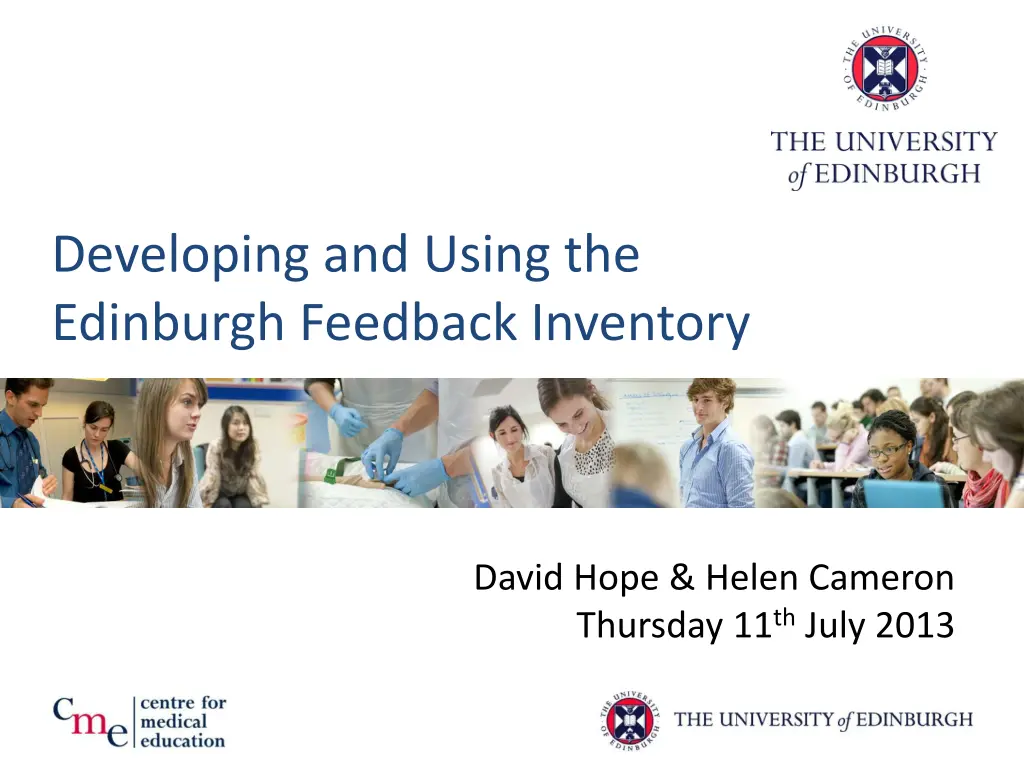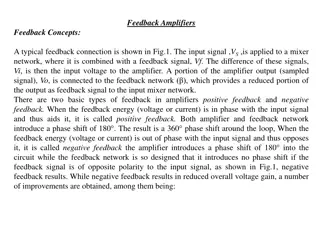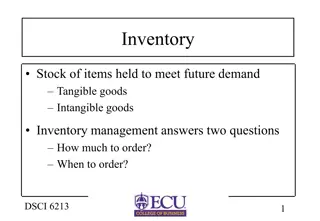
Developing and Using the Edinburgh Feedback Inventory: A Psychometric Evaluation
The Edinburgh Feedback Inventory (EFI) was developed to evaluate what students value in feedback. The inventory, consisting of 10 statements, was administered to undergraduates to assess the importance they attribute to feedback components. Findings showed strong unidimensionality and reliability, indicating the EFI as a valuable tool for understanding student perspectives on feedback.
Download Presentation

Please find below an Image/Link to download the presentation.
The content on the website is provided AS IS for your information and personal use only. It may not be sold, licensed, or shared on other websites without obtaining consent from the author. If you encounter any issues during the download, it is possible that the publisher has removed the file from their server.
You are allowed to download the files provided on this website for personal or commercial use, subject to the condition that they are used lawfully. All files are the property of their respective owners.
The content on the website is provided AS IS for your information and personal use only. It may not be sold, licensed, or shared on other websites without obtaining consent from the author.
E N D
Presentation Transcript
Developing and Using the Edinburgh Feedback Inventory David Hope & Helen Cameron Thursday 11th July 2013
Background and Purpose Despite the importance of staff-to-student feedback few tools exist to rigorously evaluate it Feedback does not consistently correlate with performance (Boehler et al. 2006, Parkes, Abercrombie and McCarty, 2012) The Edinburgh Feedback Inventory (EFI) is an attempt to create a psychometrically robust and valid measure of what students value in feedback
Feedback a broad concept Many will argue for different definitions of feedback We explicitly tested for multidimensionality through the use of a number of very different items If different students want different things, this complicates feedback delivery
Delivery 20 statements issued to 273 students in 2012 This was revised down to a 10-item form that could be answered in 5 minutes or less It was reissued in 2013 for a combined total of 422 undergraduates (response rate 52%) from the first, third, and fifth years of a medical degree At the same time students answered a set of feedback questions developed elsewhere (Murdoch-Eaton and Sargeant, 2012)
Items from Very unimportant to Very important Getting feedback in a timely fashion is Being made aware of what was expected in the assessment is The marker justifying why a mark was given is Gaining feedback on how to improve when you have done especially poorly is The marker demonstrating the system is fair is Gaining lots of feedback is Clear guidance on what constitutes a passing or excellent standard is Having clear departmental standards for feedback is Getting feedback on your weak points is Having the opportunity to clarify feedback with a tutor (if desired) is
Findings The EFI was strongly unidimensional Parallel analysis indicated one factor, Cronbach s alpha = .91 Scores on one question very strongly correlated on scores with another question But there was variability between students Mean = 4.18 SD = 0.60 The inventory seems to be a useful tool in determining how students rate the importance of feedback
Second set of items Question (1 to 6 6 is maximum) Leeds Edinburgh I consider it important to get feedback on my work 5.4 5.1* I think I receive enough feedback 3.7* 3.0* I understand what types of feedback are appropriate for the type of course/project/core unit I am studying 3.7* 3.9 I know what to do when I get feedback 4.3 4.0 I know where to get more feedback if I need it 3.1* 2.5* * Indicates statistically significant differences between early years and later years. Red indicates questions where Leeds students answered more positively than Edinburgh students
Associations between items Weak associations between EFI score and Q1 (r = .13) and Q2 (r = -.10) Students who rate individual elements of feedback as important are only very slightly more likely to rate feedback as important overall Those with a high rating of feedback are very slightly less likely to think they get enough feedback
Conclusions Students rate feedback positively, but this is not universal Students respond differently depending on whether they are asked about specific, concrete aspects of feedback or simply asked about feedback overall Institutional differences may have a large effect The unidimensional structure suggests students do not prioritise any individual aspect of feedback
Future work Because non-anonymous data is available the dataset can easily be extended We are currently adding entry data (how the student performed on admissions) We also hope to re-issue the inventory so after five years we will have at least some students who have reported on three occasions
References Boehler, M. L., Rogers, D. A., Schwind, C. J., Mayforth, R., Quin, J., Williams, R. G., & Dunnington, G. (2006). An investigation of medical student reactions to feedback: a randomised controlled trial. Medical Education, 40(8), 746- 749. Parkes, J., Abercrombie, S., & McCarty, T. (2012). Feedback sandwiches affect perceptions but not performance. Advances in Health Sciences Education, 1-11. Murdoch-Eaton, D. and Sargeant, J. (2012). Maturational differences in undergraduate medical students perceptions about feedback. Medical Education 46(7): 711-721.






















